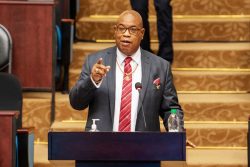Dear Editor,
The statement from the Guyana Police Force was terse “The 16-year-old complainant has decided not to pursue her rape allegation case against, Minister of Local Government and Regional Development, Nigel Dharamlall”, it brought a most unsatisfactory end to an allegation that shocked Guyana with its graphic description of the alleged rape. It leaves the accused with irreparable character damage in the court of public opinion and without realistic recourse for vindication, and it left the complainant with the claim that the system has failed her.
Those with emotive conclusions are pointing fingers at the various authorities involved, the Ministry of Human Services, the Childcare and Protection Agency, the Guyana Police Force, and Blossom Inc. who were charged with custody; the allegations of political interference/cover-up lie thick on the ground. I prefer the evidential approach and would like to know what caused the DPP to send the file back to the GPF for additional investigation; was the DPP swayed in this direction by evidence sent to her gathered by other than the police force? Is this allowed under the rules? Was there any political interference, real or imagined, etc?
The entire police file should be sent for a review of the actions of every agency involved in the case by a person of impeccable international repute, an expert in the requirements for justice to be served, a retired CCJ Justice perhaps? To be pellucid, this is not a call for the regular circus-like COI, to be manipulated by terms of reference, the parade of selective witnesses, etc. This is a call for a documentary review to examine the conduct of all agencies, persons, system/s, and policies that were utilized to assist the complainant with the hope that any flaws can be exposed and corrective measures applied. It would also behoove us to look at 69.1 of the Sexual Offences 2010 Act:
69. (1) No corroboration of the evidence of the complainant or the sworn or unsworn evidence of a child shall be required for a conviction of an offence under this Act, and the judge shall not direct the jury that it is unsafe to find the accused guilty in the absence of corroboration.
This allows for a charge and conviction based on an uncorroborated accusation; it opens a big door for blackmail and extortion and seems to be patently unfair with presumptive guilt and places a burden of proving innocence contrary to our ‘presumed innocent’ doctrine.
Editor, it is never pleasant to share an opinion that goes against the emotional grain, very few want to listen to any argument that presumes innocence in the face of graphic accusations, but these issues are too important for political gamesmanship and require our parliamentarians to work together to make improvements to this area of life that has been found wanting by this entire saga from the moment of its emergence (and trial) on social media to its unsatisfactory conclusion triggered by the decision of the accuser not to pursue the complaint. This is a golden opportunity for politicians to show us they are capable of working together for the greater good.
Sincerely,
Robin Singh






